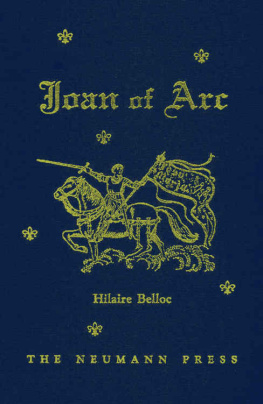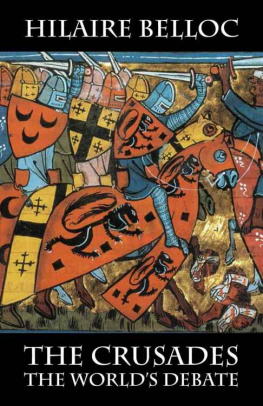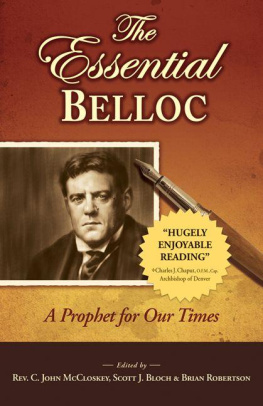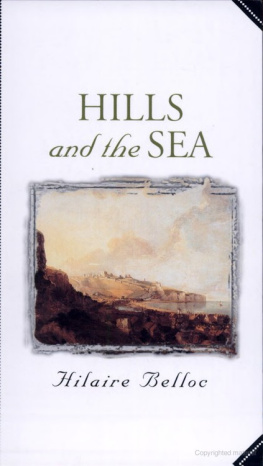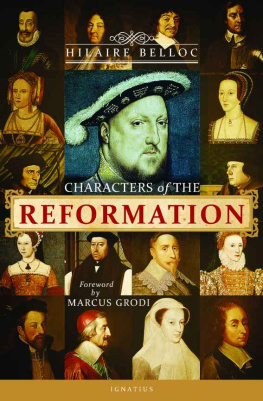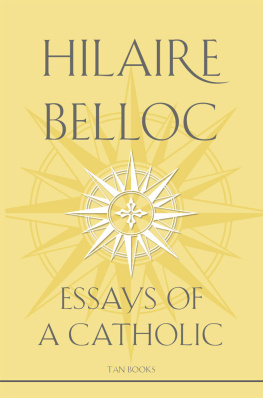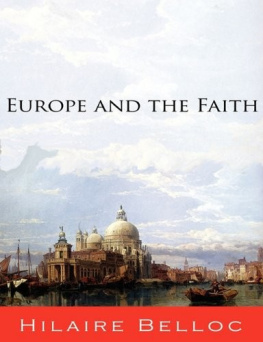Hilaire Belloc - Joan of Arc
Here you can read online Hilaire Belloc - Joan of Arc full text of the book (entire story) in english for free. Download pdf and epub, get meaning, cover and reviews about this ebook. year: 1930,2003, publisher: Kessinger Pub Co, genre: History. Description of the work, (preface) as well as reviews are available. Best literature library LitArk.com created for fans of good reading and offers a wide selection of genres:
Romance novel
Science fiction
Adventure
Detective
Science
History
Home and family
Prose
Art
Politics
Computer
Non-fiction
Religion
Business
Children
Humor
Choose a favorite category and find really read worthwhile books. Enjoy immersion in the world of imagination, feel the emotions of the characters or learn something new for yourself, make an fascinating discovery.
- Book:Joan of Arc
- Author:
- Publisher:Kessinger Pub Co
- Genre:
- Year:1930,2003
- Rating:3 / 5
- Favourites:Add to favourites
- Your mark:
- 60
- 1
- 2
- 3
- 4
- 5
Joan of Arc: summary, description and annotation
We offer to read an annotation, description, summary or preface (depends on what the author of the book "Joan of Arc" wrote himself). If you haven't found the necessary information about the book — write in the comments, we will try to find it.
Joan of Arc — read online for free the complete book (whole text) full work
Below is the text of the book, divided by pages. System saving the place of the last page read, allows you to conveniently read the book "Joan of Arc" online for free, without having to search again every time where you left off. Put a bookmark, and you can go to the page where you finished reading at any time.
Font size:
Interval:
Bookmark:
Joan of Arc
Hilaire Belloc
JOAN OF ARC
ISBN 0-911845-45-3
To
My Daughter Elizabeth

JOAN of ARC at the Consecration of Charles VII: Ingres. (Louvre, Paris.)

JOAN of ARC: Sculpture by Franois Rude (1784-1855). (Louvre, Paris.)
FIVE HUNDRED YEARS AGO, AND MORE, THERE WAS in France an old mad king whose wife was a German harlot, mocking him. All in his realm was distracted; for when kingship is weak the powerful oppress and destroy. And among the miseries of the time was this: that the kingdom was riven by rivals.
King John of the family of Valois, the grandfather of the old mad king (the same who had fought against the King of England at Crcy and had been made prisoner at Poitiers) had been well defended in battle by a young son of his called Philip, and to reward him he called him "Philip the Bold" and gave him the great Province of Burgundy, to the east, to govern, making him Duke of Burgundy, him and his sons after him. But this he was to hold in fealty of the king his father, and later of the kings his successors; which he did.
But when King John was long dead, and his grandsons were Duke of Burgundy and King of France, the new Duke of Burgundy was galled by his subjection to his cousin the King of France; for he was powerful in his own country and secretly desired to break faith and hold it alone and free. So when it was seen that his cousin the King of France would remain of feeble mind, Burgundy took the right to rule in his name. But the mad king's own brother (who was called Duke of Orleans) challenged, and a bitter feud arose between them as to which should govern in the name of the mad king; and the people of France and the priests and bishops and nobles, and the lawyers and learned doctors of the universities, made two partiessome for Burgundy and some for Orleansso they were like two nations, until, in an evil day, Burgundy had Orleans murdered.
Then, indeed, it was war. And as the young Duke of Orleans, the son of the murdered man, had married the daughter of a strong lord of the south, called Armagnac, those of his party were called "The Armagnacs" and those of Burgundy were called "The Burgundians" (in the French, "Bourgignon"); and they fought against one another which should hold Paris, the head city of the realm, and rule the king, and they laid the realm waste between them with foul massacres and burnings.
Now, the kings of England in those days were also born of great French princes, being of the family of Plantagenet from Anjou, and they had long claimed to be rightful kings of France through a princess of France, heiress of that country (whose tongue also they spoke, as did their nobles), and called themselves of better right than the family of Valois. So, seeing how distraught and weakened were the Valois by this deadly quarrel of Armagnac and Bourgignon, Valois Orleans against Valois Burgundy, the King of England, Henry Plantagenet, fifth of that name, came into France with an army small, but very good. He overthrew the great host of the Armagnacs at Agincourt and took prisoner the young Duke of Orleans himself (the Burgundians refusing aid), and went on to take the castles and walled towns of the north one after another, even great Rouen after a dreadful siege; and, even as he was so conquering, the Armagnacs, remembering the murder of the elder Duke of Orleans, murdered the Duke of Burgundy in their turn. His young son, a mighty soldier, was filled with vengeance and joined the English king; saying also, within himself: "So shall I be more free when the King of France is dead."
But this new Duke of Burgundy, Philip by name, was of the strongest spirit among the great of his day, and had a face hard and eager as though carven of dark wood, and above his eyes were thick black brows with ends that rose upwards, so that, when he was in his angers, men said they seemed like horns.
That German harlot, the Queen of France, had given aid first to one side and then to the other, and now that Burgundy was masterfor he held Paris and with him was the Plantagenetshe declared for him (whom she had long supported) and favored his plan, which was this: that Henry should marry her daughter and be Regent of France, abetting Burgundy's power, and that the child of Henry and her daughter should be King of France when the mad king should die. For she said that this daughter of hers was the rightful heir, being the mad king's true daughter. And although she had a son also living, called Charles (a very young man whom the Armagnacs protected and to whom of plain right should fall the kingdom), this son, she said, was no true heir.
For she was so shameless that she called him bastard, saying that the poor king was not his father; and she was such a wanton that many believed her. For they said: "Would his own mother call him bastard if he were not so?"
But she lied, as she ever did; for that very young man was indeed the mad king's son and the true heir to France, so that he was called the Dauphin, which was the title now borne by the eldest prince of the blood royal. He and his had no strength to stand against their enemies, and he had fled southward beyond Loire, when, soon after, in the year of Our Lord fourteen hundred and twenty-two, Henry Plantagenet, King of England, died, leaving a baby boy nine months old, the son of himself and that French princess by their marriage, whom they called Henry, sixth of that name. And two months later the old mad king died, too. The baby boy Henry should have been crowned at Rheims, if indeed Burgundy would make him King of France, for that was the rightful place of crowning and anointing for the kings of France, and was in Burgundian power. But the dead King Henry's brother, Duke of Bedford, who had been left regent, dared not take so young a child many leagues through country where war bands roved, and he put off to some later time the solemnity of Rheims which alone made a King of France very king in his people's eyes.
Yet all things opposed the Dauphin, Charles of Valois; for strong Burgundy held all the east and Bedford all the north, and they were allied, with Paris in their hold and favoring them. His poor forces were discouraged, his captains blundered, he was but nineteen and weak of blood with feeble legs beneath him and a soul too timid, his counsellors foolish or false and his moneys failing. Of his own people, daily more abandoned him, and the Church, the ancient prop of his royal house, was divided.
For two popes and even three had but lately claimed one against the other, bringing the Vicarship of Christ to mockery; and the churchmen had made a great council which called itself the Church and gave out its power to make and unmake the lordship of Christian men and to be supreme even over the chair of Peter, and soon was to be another council, with Burgundy and the English for the council, and the Dauphin Charles for the pope: all was in confusion. Therefore, many bishops and great abbots and the University of Paris, to whose voice all men attended, favored his foes.
Allies he had none, save the Scottish people, the unceasing enemies of England. These, indeed, had sent him very good soldiers, but few, and at Verneuil, when he desperately tried his chance in battle, his battalions were scattered. His men still fought, had the better of a skirmish, relieved a stronghold; but the darkness grew. Town upon town and castle upon castle declared for the enemy. St. Denis, the shrine of the kings and their sacred oriflamme, was in his foeman's hands, and the myriads of Parisor their chiefswere against him. He had no hope but by offers to wean his cousin Philip of Burgundy from Bedford and the Plantagenet child; a tangled intrigue without issue, for no one about him could fathom Burgundy, his deep and subtle mind.
Next pageFont size:
Interval:
Bookmark:
Similar books «Joan of Arc»
Look at similar books to Joan of Arc. We have selected literature similar in name and meaning in the hope of providing readers with more options to find new, interesting, not yet read works.
Discussion, reviews of the book Joan of Arc and just readers' own opinions. Leave your comments, write what you think about the work, its meaning or the main characters. Specify what exactly you liked and what you didn't like, and why you think so.

